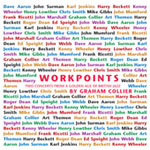Home » Jazz Articles » Album Review » Graham Collier: Workpoints
Graham Collier: Workpoints
Not to suggest that British artists weren't paying attention to developments taking place across the Atlantic, but an important shift began to occur during this period, and American musicians also took note of emerging British players. Woodwind multi-instrumentalist John Surman, trombonist/composer/arranger Mike Gibbs, and trumpeter Kenny Wheeler were among those being noticed, if not by the larger listening public in North America, then at least by their American jazz-playing counterparts.
When bassist Graham Collier returned to England after being the first British musician to graduate from Boston's Berklee School of Music on a Downbeat Scholarship in '63, he also became the first British jazz musician to receive a commission from the Arts Council of Great Britain. The result was "Workpoints, a four-part suite for large ensemble that used composition and arrangement as the foundation for a more liberated approach to improvisation. But while Collier would perform the suite in Britain, a recording of it has never materialized—until now. With Workpoints, Cuneiform continues its commitment to rescuing important archival recordings and giving them the exposure they deserve—past such releases have included material by Soft Machine, Nucleus, and John Surman.
Workpoints documents two performances—a twelve-piece show from '69 performing the "Workpoints suite, along with two other Collier compositions; and a '75 recording for sextet. While the recording quality is less than optimal, in particular the '75 recording, where there's a considerable amount of distortion during the first twenty minutes, but the performances and compositions—most of which have never seen the light of day—render such concerns secondary.
The '75 concert is of slightly lesser value, and it's somewhat dated by Ed Speight's distorted guitar (later in the set he returns to a cleaner, more satisfying tone) and penchant for clichéd rock rhythms. Still, there's plenty of energy, and the four-part "Darius suite is worth the price of admission.
More important is the '69 concert, which features a who's who of British players, including trumpeters Kenny Wheeler, Harry Beckett, and Henry Lowther; woodwind multi-instrumentalists John Surman and Karl Jenkins (who, along with drummer John Marshall, would go on to greater fame with Nucleus and Soft Machine); and trombonist Mike Gibbs. Collier's conception of a large ensemble is akin to a more polite and straightforward version of William Parker's Little Huey Creative Music Orchestra. Structure defines it, but so does collective improvisation, usually in instrumental subsets where the idea of pure freedom is belied by the horn orchestrations.
While there are better-recorded examples of Collier's work, both "Workpoints and "Darius are compelling examples of an emergent, distinctive approach to jazz that can only be described as British.
Visit Graham Collier on the web.
Track Listing
Disc One: Deep Dark Blue Centre; The Barley Mow; Workpoints Part One; Workpoints Part Two; Workpoints Part Three; Workpoints Part Four. Disc Two: Little Ben; Under the Pier; Darius Part One; Darius Part Three; Darius Part Four; Darius Part One Reprise; Clear Moon; Mackarel Sky.
Personnel
Graham Collier
composer / conductorDisc One, Workpoints: Kenny Wheeler (trumpet, flugelhorn); Harry Beckett (trumpet, flugelhorn); Henry Lowther (trumpet, flugelhorn); Dave Aaron (alto, tenor and soprano saxophones, flute); John Surman (baritone and soprano saxophones, bass clarinet, piano); Karl Jenkins (baritone and soprano saxophones, oboe, piano); Chris Smith (trombone); Mike Gibbs (trombone); John Mumford (trombone, cowbell); Frank Ricotti (vibraphone, bongos); Graham Collier (bass, leader); John Marshall (drums). Disc Two, Live in Middleheim: Harry Beckett (trumpet, flugelhorn); Art Themen (tenor and soprano saxophone); Ed Speight (guitar); Roger Dean (piano, electric piano); Graham Collier (bass, leader); John Webb (drums).
Album information
Title: Workpoints | Year Released: 2005 | Record Label: Cuneiform Records
Tags
PREVIOUS / NEXT
Support All About Jazz
 All About Jazz has been a pillar of jazz since 1995, championing it as an art form and, more importantly, supporting the musicians who make it. Our enduring commitment has made "AAJ" one of the most culturally important websites of its kind, read by hundreds of thousands of fans, musicians and industry figures every month.
All About Jazz has been a pillar of jazz since 1995, championing it as an art form and, more importantly, supporting the musicians who make it. Our enduring commitment has made "AAJ" one of the most culturally important websites of its kind, read by hundreds of thousands of fans, musicians and industry figures every month.





















